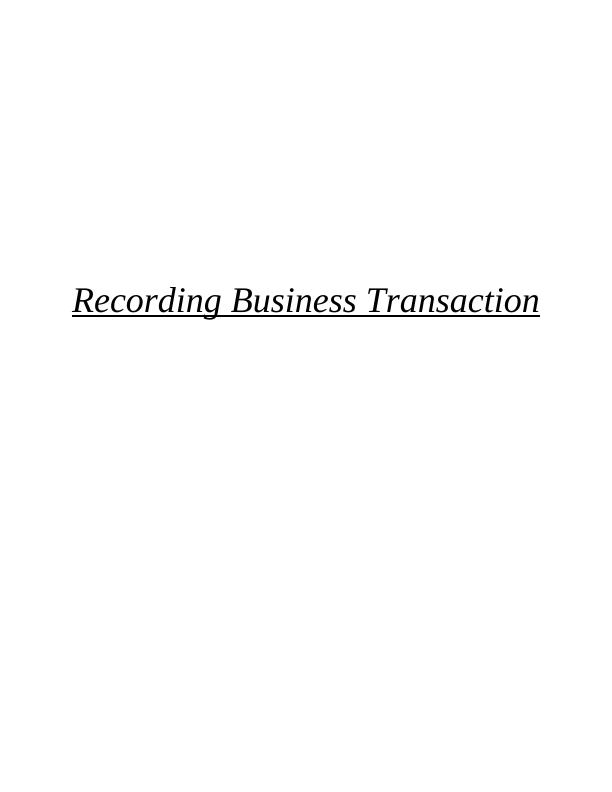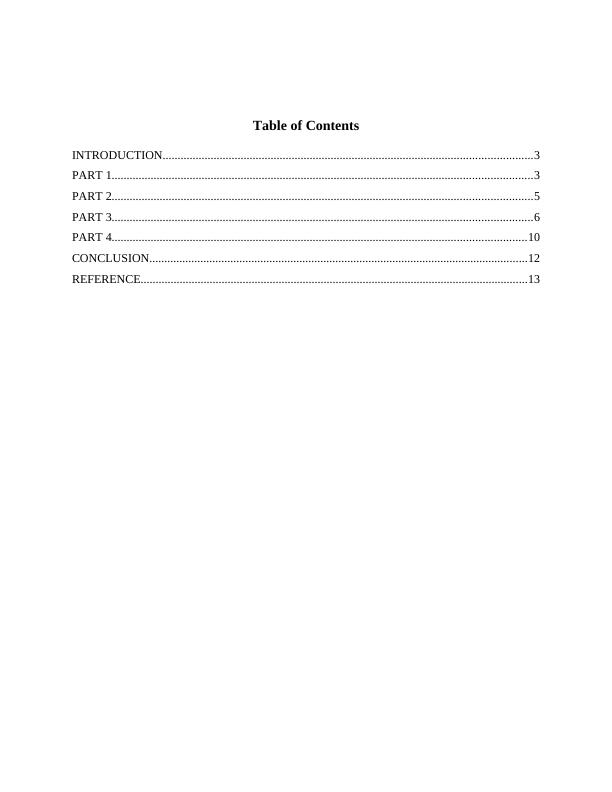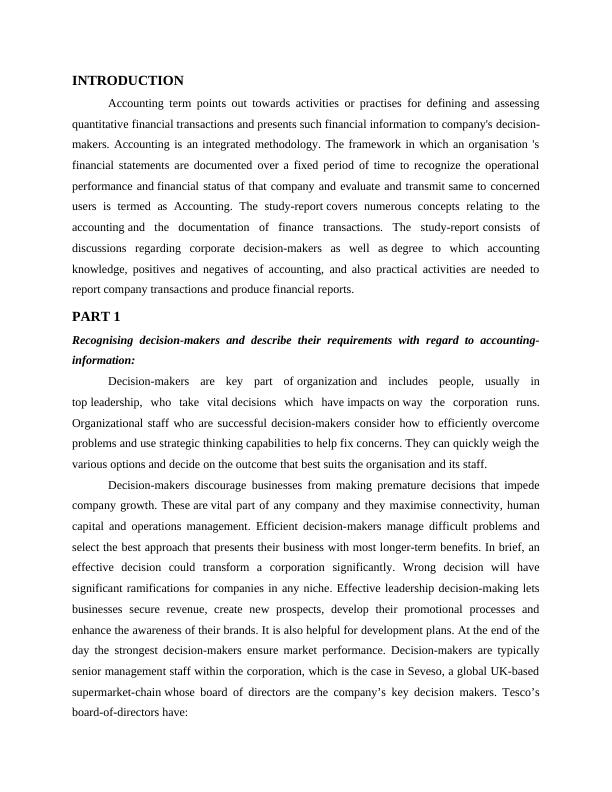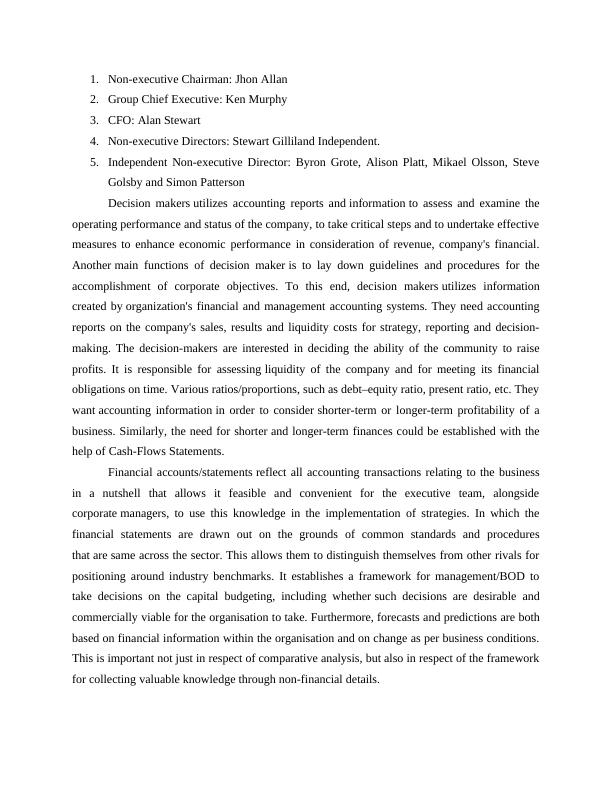Recording Business Transaction
Added on 2023-01-03
13 Pages2100 Words54 Views
Recording Business Transaction

Table of Contents
INTRODUCTION...........................................................................................................................3
PART 1............................................................................................................................................3
PART 2............................................................................................................................................5
PART 3............................................................................................................................................6
PART 4..........................................................................................................................................10
CONCLUSION..............................................................................................................................12
REFERENCE.................................................................................................................................13
INTRODUCTION...........................................................................................................................3
PART 1............................................................................................................................................3
PART 2............................................................................................................................................5
PART 3............................................................................................................................................6
PART 4..........................................................................................................................................10
CONCLUSION..............................................................................................................................12
REFERENCE.................................................................................................................................13

INTRODUCTION
Accounting term points out towards activities or practises for defining and assessing
quantitative financial transactions and presents such financial information to company's decision-
makers. Accounting is an integrated methodology. The framework in which an organisation 's
financial statements are documented over a fixed period of time to recognize the operational
performance and financial status of that company and evaluate and transmit same to concerned
users is termed as Accounting. The study-report covers numerous concepts relating to the
accounting and the documentation of finance transactions. The study-report consists of
discussions regarding corporate decision-makers as well as degree to which accounting
knowledge, positives and negatives of accounting, and also practical activities are needed to
report company transactions and produce financial reports.
PART 1
Recognising decision-makers and describe their requirements with regard to accounting-
information:
Decision-makers are key part of organization and includes people, usually in
top leadership, who take vital decisions which have impacts on way the corporation runs.
Organizational staff who are successful decision-makers consider how to efficiently overcome
problems and use strategic thinking capabilities to help fix concerns. They can quickly weigh the
various options and decide on the outcome that best suits the organisation and its staff.
Decision-makers discourage businesses from making premature decisions that impede
company growth. These are vital part of any company and they maximise connectivity, human
capital and operations management. Efficient decision-makers manage difficult problems and
select the best approach that presents their business with most longer-term benefits. In brief, an
effective decision could transform a corporation significantly. Wrong decision will have
significant ramifications for companies in any niche. Effective leadership decision-making lets
businesses secure revenue, create new prospects, develop their promotional processes and
enhance the awareness of their brands. It is also helpful for development plans. At the end of the
day the strongest decision-makers ensure market performance. Decision-makers are typically
senior management staff within the corporation, which is the case in Seveso, a global UK-based
supermarket-chain whose board of directors are the company’s key decision makers. Tesco’s
board-of-directors have:
Accounting term points out towards activities or practises for defining and assessing
quantitative financial transactions and presents such financial information to company's decision-
makers. Accounting is an integrated methodology. The framework in which an organisation 's
financial statements are documented over a fixed period of time to recognize the operational
performance and financial status of that company and evaluate and transmit same to concerned
users is termed as Accounting. The study-report covers numerous concepts relating to the
accounting and the documentation of finance transactions. The study-report consists of
discussions regarding corporate decision-makers as well as degree to which accounting
knowledge, positives and negatives of accounting, and also practical activities are needed to
report company transactions and produce financial reports.
PART 1
Recognising decision-makers and describe their requirements with regard to accounting-
information:
Decision-makers are key part of organization and includes people, usually in
top leadership, who take vital decisions which have impacts on way the corporation runs.
Organizational staff who are successful decision-makers consider how to efficiently overcome
problems and use strategic thinking capabilities to help fix concerns. They can quickly weigh the
various options and decide on the outcome that best suits the organisation and its staff.
Decision-makers discourage businesses from making premature decisions that impede
company growth. These are vital part of any company and they maximise connectivity, human
capital and operations management. Efficient decision-makers manage difficult problems and
select the best approach that presents their business with most longer-term benefits. In brief, an
effective decision could transform a corporation significantly. Wrong decision will have
significant ramifications for companies in any niche. Effective leadership decision-making lets
businesses secure revenue, create new prospects, develop their promotional processes and
enhance the awareness of their brands. It is also helpful for development plans. At the end of the
day the strongest decision-makers ensure market performance. Decision-makers are typically
senior management staff within the corporation, which is the case in Seveso, a global UK-based
supermarket-chain whose board of directors are the company’s key decision makers. Tesco’s
board-of-directors have:

1. Non-executive Chairman: Jhon Allan
2. Group Chief Executive: Ken Murphy
3. CFO: Alan Stewart
4. Non-executive Directors: Stewart Gilliland Independent.
5. Independent Non-executive Director: Byron Grote, Alison Platt, Mikael Olsson, Steve
Golsby and Simon Patterson
Decision makers utilizes accounting reports and information to assess and examine the
operating performance and status of the company, to take critical steps and to undertake effective
measures to enhance economic performance in consideration of revenue, company's financial.
Another main functions of decision maker is to lay down guidelines and procedures for the
accomplishment of corporate objectives. To this end, decision makers utilizes information
created by organization's financial and management accounting systems. They need accounting
reports on the company's sales, results and liquidity costs for strategy, reporting and decision-
making. The decision-makers are interested in deciding the ability of the community to raise
profits. It is responsible for assessing liquidity of the company and for meeting its financial
obligations on time. Various ratios/proportions, such as debt–equity ratio, present ratio, etc. They
want accounting information in order to consider shorter-term or longer-term profitability of a
business. Similarly, the need for shorter and longer-term finances could be established with the
help of Cash-Flows Statements.
Financial accounts/statements reflect all accounting transactions relating to the business
in a nutshell that allows it feasible and convenient for the executive team, alongside
corporate managers, to use this knowledge in the implementation of strategies. In which the
financial statements are drawn out on the grounds of common standards and procedures
that are same across the sector. This allows them to distinguish themselves from other rivals for
positioning around industry benchmarks. It establishes a framework for management/BOD to
take decisions on the capital budgeting, including whether such decisions are desirable and
commercially viable for the organisation to take. Furthermore, forecasts and predictions are both
based on financial information within the organisation and on change as per business conditions.
This is important not just in respect of comparative analysis, but also in respect of the framework
for collecting valuable knowledge through non-financial details.
2. Group Chief Executive: Ken Murphy
3. CFO: Alan Stewart
4. Non-executive Directors: Stewart Gilliland Independent.
5. Independent Non-executive Director: Byron Grote, Alison Platt, Mikael Olsson, Steve
Golsby and Simon Patterson
Decision makers utilizes accounting reports and information to assess and examine the
operating performance and status of the company, to take critical steps and to undertake effective
measures to enhance economic performance in consideration of revenue, company's financial.
Another main functions of decision maker is to lay down guidelines and procedures for the
accomplishment of corporate objectives. To this end, decision makers utilizes information
created by organization's financial and management accounting systems. They need accounting
reports on the company's sales, results and liquidity costs for strategy, reporting and decision-
making. The decision-makers are interested in deciding the ability of the community to raise
profits. It is responsible for assessing liquidity of the company and for meeting its financial
obligations on time. Various ratios/proportions, such as debt–equity ratio, present ratio, etc. They
want accounting information in order to consider shorter-term or longer-term profitability of a
business. Similarly, the need for shorter and longer-term finances could be established with the
help of Cash-Flows Statements.
Financial accounts/statements reflect all accounting transactions relating to the business
in a nutshell that allows it feasible and convenient for the executive team, alongside
corporate managers, to use this knowledge in the implementation of strategies. In which the
financial statements are drawn out on the grounds of common standards and procedures
that are same across the sector. This allows them to distinguish themselves from other rivals for
positioning around industry benchmarks. It establishes a framework for management/BOD to
take decisions on the capital budgeting, including whether such decisions are desirable and
commercially viable for the organisation to take. Furthermore, forecasts and predictions are both
based on financial information within the organisation and on change as per business conditions.
This is important not just in respect of comparative analysis, but also in respect of the framework
for collecting valuable knowledge through non-financial details.

End of preview
Want to access all the pages? Upload your documents or become a member.
Related Documents
Recording Business Transactionlg...
|15
|2647
|97
Recording Business Transactionlg...
|13
|2642
|68
Recording Business Transactionlg...
|13
|2257
|87
Recording Business Transactionlg...
|15
|2615
|25
Evaluation of Pan African Resources plc ltd.lg...
|17
|3880
|41
Accounting of Business Transactions (Cai 2019)lg...
|21
|3846
|295
